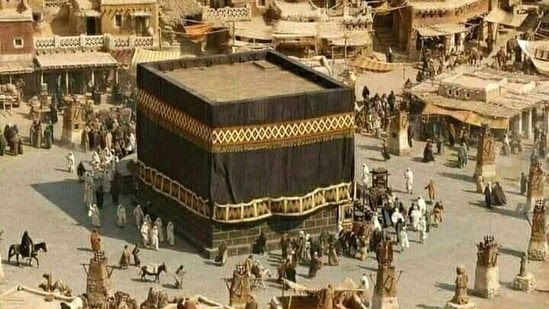– Ayesha Sultana
As Hajj 2024 approaches, the annual pilgrimage to Makkah in Saudi Arabia is poised to welcome millions of Muslims from around the globe, reflecting a tradition that dates back millennia. The Hajj is not only a profound spiritual journey but also one deeply rooted in the rich history of Islam, beginning with the story of Prophet Ibrahim (Abraham) and his son Ismail (Ishmael).
The Beginnings: Prophet Ibrahim and the Kaaba
Muslims believe that God commanded Prophet Ibrahim to leave his wife Hajar and their son Ismail in the desolate desert of Makkah. Initially prosperous, their circumstances deteriorated over time, leading Hajar to desperately search for water to sustain her child. In her quest, she traveled seven times between the hills of Safa and Marwah. It was only when Ismail rubbed his foot against the ground that a miraculous spring of water, known as the Zamzam well, gushed forth. This site was then sanctified, and God instructed Ibrahim to construct the Kaaba there and to call people to pilgrimage.
Ibrahim, revered as the dearest friend of Allah and the father of prophets, along with his son Ismail, built the Kaaba as a place of worship dedicated to the one true God, Allah. According to Islamic tradition, the archangel Gabriel brought the Black Stone from heaven to be placed in the Kaaba. Originally white, the stone is believed to have turned black by absorbing the sins of the thousands of pilgrims who have kissed and touched it over centuries.
The Evolution of Hajj
The annual pilgrimage to the Kaaba was already a significant event for the Arab tribes of the Arabian Peninsula long before the advent of Islam. However, the practices associated with Hajj were radically transformed and revitalized by Prophet Muhammad in the 7th century CE. During this pre-Islamic period, known as the time of jahiliyyah or ignorance, pagan idols surrounded the Kaaba, and the pilgrimage included various polytheistic rituals.
In 630 CE, Prophet Muhammad ﷺ led the believers from Medina to Makkah, where he cleansed the Kaaba by destroying all the pagan idols, thereby restoring its monotheistic purpose. Muhammad ﷺ is regarded in Islam as the final prophet, following in the tradition of Ibrahim. His actions reconsecrated the Kaaba to Allah, and he emphasized the pure monotheistic worship that Ibrahim had established.
Prophet Muhammad’s own performance of Hajj in 632 CE was particularly momentous. During this pilgrimage, he delivered his famous farewell sermon to thousands of Muslims gathered in the plain of Arafah. This event marked the standardization of the Hajj rituals, which became a cornerstone of Islamic practice. Muhammad’s actions and instructions during this pilgrimage ensured that Hajj was enshrined as one of the five pillars of Islam, making it an obligatory act of worship for all Muslims who are physically and financially able to undertake it.
The Enduring Legacy of Hajj
Today, Hajj stands as a powerful symbol of faith, unity, and submission to God’s will. It brings together Muslims from diverse backgrounds, reflecting the universal and inclusive nature of Islam. The pilgrimage serves as a reminder of the shared heritage and values of the Muslim Ummah (community).
Every year, millions of pilgrims from around the world converge on Makkah, retracing the steps of Ibrahim, Hajar, Ismail, and Prophet Muhammad ﷺ. The rituals of Hajj – circumambulating the Kaaba, running between Safa and Marwah, standing in prayer at Arafah, and performing the symbolic stoning of the devil – are deeply imbued with historical and spiritual significance.
Hajj 2024 will continue this ancient tradition, providing a profound spiritual experience for those who participate. It remains a testament to the enduring faith and resilience of the Muslim community, as well as a reflection of the timeless message of Islam: submission to the one true God, Allah.




